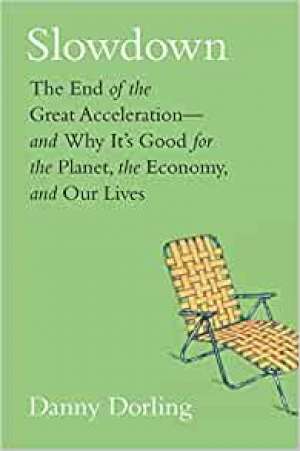23 July 2020
Slowdown:
The End of the Great Acceleration‑and Why It’s Good for the Planet, the Economy, and Our Lives
Danny Dorling
2020, Yale University Press, 400 pages,
ISBN 9780300243406
Reviewer: Vicky Pryce, Board Member, CEBR

Apparently we have, since the 1960s, stopped getting taller!! My 6 ft 4” son, take note. Fortunately for my children and grandchildren IQ continues to rise by 3 points each decade. But even that is more a reflection not necessarily of brains expanding but mostly of better training that allows us to deal – as Danny Dorling, Professor of Geography at the University of Oxford, argues in this fascinating book – with “paper-based mathematical ability, analytical thinking, spatial recognition and short-term memory”.
But behind all this the world overall is slowing down. Not just the hopefully relatively short -term slowdown in GDP due to the coronavirus pandemic. But much more in relation to population growth which had been growing exponentially for the last century and a half. This seems no longer to be the case and hence the title of the book.
Danny Dorling is speculating here about what kind of impact this “new normal “will have on all of us. Can we really, as he suggests, capitalise on this, change the way we think, manage to stabilise the economy and, in the process, reverse the renewed trend to inequality of recent years?
The coronavirus crisis has allowed a controlled (though involuntary in many ways) experiment of what it means when large parts of the world economy just come to an abrupt halt. Manufacturing, private services, construction, travel, hospitality, cross-border trade have all been negatively affected. As a consequence, the concept of continuous and perpetual acceleration of economic growth as a given is being questioned in a serious way. With crises coming so frequently and questioning much of what we have got used to, has Danny Dorling’s vision of the future itself been accelerated by the virus ?
Perhaps. But, if so, will it be good or bad? Those of us who have enjoyed the progress through the generations and benefited from big leaps in prosperity often brought about by giant technology leaps through our lives will wonder whether slowdown is something to be hoped for or feared.
Dorling’s thesis is that we have no choice but to accept it and adapt to it because it is happening anyway. And there are big potential benefits if this is properly understood and embraced. I found it so interesting that one example he uses is an Athenian couple he knew who gave up their daily pressured jobs to move to an island and improve their lives. Great stuff. But was assured when reading it that they soon found ways of earning handsomely by developing specialist services for tourists coming to the island!
In other words Dorling doesn’t argue that capitalism will be over. But it needs to recognise, as it surely will have to sooner or later, that we are consuming too much and that ‘trickle-down economics’ doesn’t work – and it is even worse to pretend that it does. Amassing wealth at an ever increasing rate is leading to huge inequalities further down and is, in fact, making others poorer. In a shrinking population environment that is unsustainable, Dorling argues.
So slowing down in his mind makes sense. His message is reinforced by his belief that technological progress as he puts it, ‘is now so slow that a minor adaptation to a common household appliance can be heralded as a great advance’. Here he refers to James Dyson’s invention of a bag-less vacuum cleaner for which he says James Dyson received a knighthood. That would be unthinkable a century earlier as life- transforming technological innovation was then occurring at an amazingly rapid pace.
By not needing to destroy so much of the environment to feed a no longer exponentially rising population we can, under the right leaders, adapt to a slower, greener, happier way of life. Dorling may well be right. But witnessing the desperate attempts to get the economy moving after covid right now one wonders whether the ‘elites’ he so frets about in the book have, in fact, quite realised that our world may be changing for ever.
